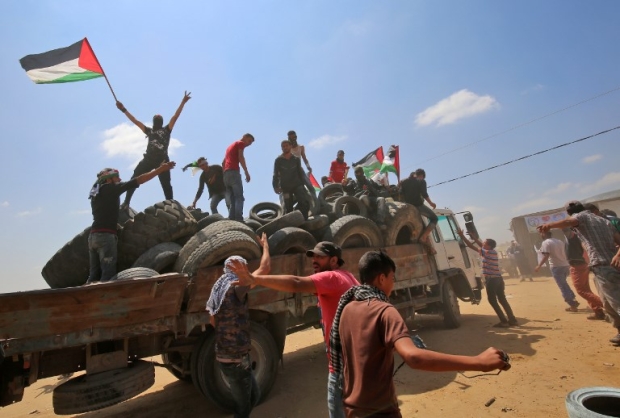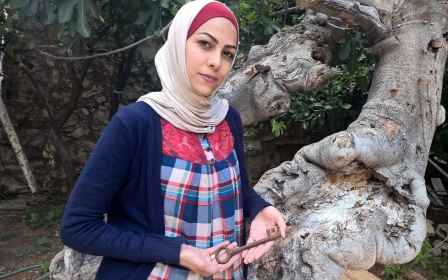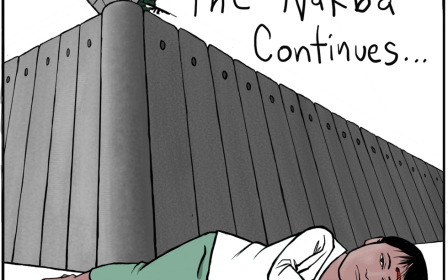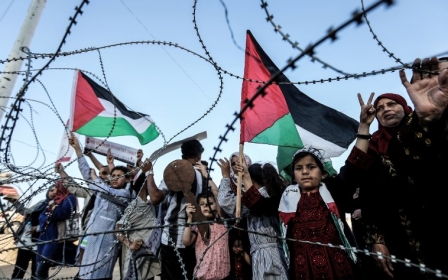Gaza's Great Return March: How Palestinians are reclaiming their land

As the Palestinian struggle for self-determination continues in the 70th year of their dispossession, the Great Return March movement is highlighting the roots of this battle: the relationship between indigenous people and their land.
Respect for the land guides many indigenous peoples’ relationship to the world around them. It is a sacred relationship, based on responsibility to the land that cares and nurtures with its abundance of resources. Indigenous history and storytelling stems from these ties to the land.
Zionism, meanwhile, is a political movement aiming to establish and maintain a Jewish homeland in historic Palestine. Like Puritans in the context of Native Americans, Zionists have used religious and political justifications to accomplish their goals.
Colonial narrative
The establishment of kibbutzim was one of the ways that Zionists used settler-colonial industrialisation in the name of returning to “authenticity”. In fact, one of the distinctive facets of the memoricide (destruction of cultural history) and colonisation by the Zionist establishment in the historic land of Palestine was the replacement of native olive trees with European pine trees.
This was not only an attempt to facilitate a colonial narrative of “bringing civilization to a barren land and making the desert bloom”, but also an attempt to make the land itself reflect the colonial narrative, further distancing it from its indigenous population.
'They have stolen our cultural heritage, our popular folklore and have claimed it as theirs'
In his famous speech at the United Nations General Assembly in November 1974, the late Yasser Arafat reminded the world of this by stating: “[Zionist] terrorism fed on hatred and this hatred was even directed against the olive tree in my country, which has been a proud symbol and which reminded them of the indigenous inhabitants of the land, a living reminder that the land is Palestinian. Thus they sought to destroy it.
“They see in the Palestinian child, in the Palestinian tree, an enemy that should be exterminated … They have stolen our cultural heritage, our popular folklore and have claimed it as theirs.”
Ethnic cleansing
Today, the relationship between Zionist settlers and the land continues to manifest in negative ways, such as the uprooting of centuries-old olive trees, the deliberate destruction of agricultural fertility by spraying toxins over Palestinian lands, and other forms of agricultural terrorism, including the annihilation of vineyards with chainsaws.
“This is a particularly horrible sight because all the damage was wrought by the hand of man,” a Haaretz column noted on the chainsaw incident. “A wicked, loathsome hand that hates not only Arabs but despises the land itself … And someone also had to smear the threatening words in Hebrew on a rock: ‘We will reach everywhere.’”
Regardless, Palestinians are maintaining and preserving their indigeneity through their relationship with the land via tactics known as the “Green Intifada” or “guerilla gardening”, which seek to “reclaim public space from its corporate governors”.
Olive trees resurge
Importantly, even after 70 years of Israel’s attempted annihilation of the indigeneity of Palestine through geographical manipulation, the olive trees that the European pines were planted over are resurging.
In the same vein, the Great Return March is a resurgence that stems from the ongoing process of Zionist "discovery" and memoricide perpetually imposed on Palestinians. It is a process of ongoing recovery that attempts to preserve Palestinians’ distinctive relationship with their land, symbolising the fundamental characteristics of that relationship: peace, love and respect.
- Ahmad Moussa is a human rights scholar and activist and a regular contributor and freelance writer for various international news agencies. He is a scholar of indigenous and Middle Eastern issues. He is also a human rights activist with a master of arts in international law and human rights. Moussa is currently involved in research for a doctoral degree in war studies.
The views expressed in this article belong to the author and do not necessarily reflect the editorial policy of Middle East Eye.
Photo: A Palestinian boy waves a national flag by Israeli soldiers evacuating protesters from a school site being demolished in the village of Yatta, south of the West Bank city of Hebron and to be relocated in another area, on 11 July, 2018 (AFP)
New MEE newsletter: Jerusalem Dispatch
Sign up to get the latest insights and analysis on Israel-Palestine, alongside Turkey Unpacked and other MEE newsletters
Middle East Eye delivers independent and unrivalled coverage and analysis of the Middle East, North Africa and beyond. To learn more about republishing this content and the associated fees, please fill out this form. More about MEE can be found here.






